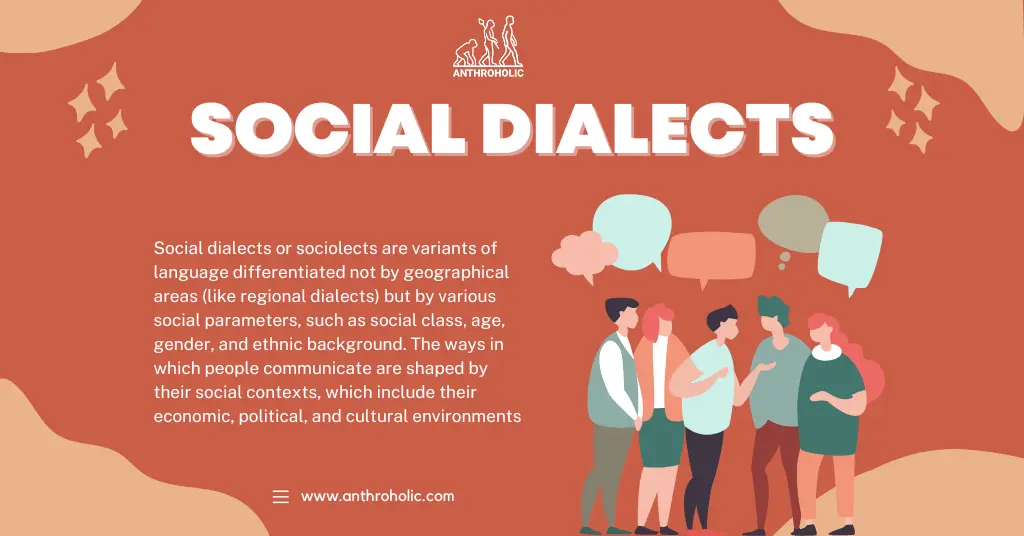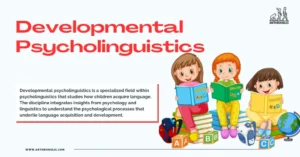AI Answer Evaluation Platform Live Now. Try Free Answer Evaluation Now
Social Dialects
Social dialects or sociolects are variants of language differentiated not by geographical areas (like regional dialects) but by various social parameters, such as social class, age, gender, and ethnic background. The ways in which people communicate are shaped by their social contexts, which include their economic, political, and cultural environments. These variations can include differences in:
- Vocabulary
- Pronunciation
- Syntax
- Morphology

The Anthropological Importance of Social Dialects
Social dialects offer a fertile ground for anthropological research due to their ability to reveal deeper social dynamics. This includes:
- Societal Structures and Hierarchies: Social dialects reflect societal structures and hierarchies, with different social classes often using distinctive dialects.
- Social Identity: They represent one’s social identity and affiliation. Individuals may use a specific dialect to assert their belonging to a particular social group.
- Cultural Patterns and Change: Social dialects are mirrors to the broader cultural patterns and shifts. They evolve over time, tracing the history and transformation of societies.
The Influence of Social Factors on Dialects
Different social factors impact the formation and use of social dialects, including but not limited to:
| Social Factors | Influence on Dialects |
|---|---|
| Social Class | Higher and lower social classes often have distinct dialects, reflecting the socio-economic divide. |
| Age | Generational shifts in dialect are common, representing changing social realities. |
| Gender | Gendered language use is observed across cultures, with men and women exhibiting differential usage patterns. |
| Ethnicity | Ethnic groups often develop distinct dialects as markers of identity and heritage. |
Methodologies in Studying Social Dialects
A range of research methodologies are employed in the anthropological study of social dialects. These include:
- Ethnographic Research: This involves participant observation and fieldwork to understand the context in which dialects are used.
- Sociolinguistic Interviews: This involves structured and semi-structured interviews, allowing researchers to explore the usage and significance of social dialects.
- Corpus Analysis: This is the systematic study of language as expressed in corpora (samples of real-world text or speech), which allows patterns in social dialect usage to be identified.
Social Dialects and Education
The intersection of social dialects and education provides another interesting area of investigation. The educational system often prioritizes the standard language, neglecting the value and richness of social dialects. Consequently, students speaking non-standard dialects may face challenges in adapting to the linguistic norms of the education system. This raises important questions about linguistic equality and the appreciation of linguistic diversity in education.
Enhancing Linguistic Diversity in Education
Many researchers advocate for a more inclusive approach in education that respects linguistic diversity. Key strategies to achieve this may include:
- Bilingual Education: Encouraging bilingual education can help accommodate speakers of non-standard dialects, fostering a more inclusive environment.
- Teacher Training: Teachers should be trained to respect linguistic diversity and adapt teaching methods to accommodate non-standard dialects.
- Language Awareness Programs: These programs can help promote respect and appreciation for linguistic diversity among students.
Social Dialects and Code-Switching
Code-switching, the practice of alternating between different languages or dialects within the same conversation, is another fascinating facet of social dialects. It is often employed as a strategy for navigating different social scenarios, reinforcing group identity, or demonstrating cultural competence. Code-switching has gained interest among anthropologists for its ability to illuminate the dynamism of linguistic practices and their intricate ties with social realities.
The Future of Social Dialects
With increasing globalization and the widespread use of digital communication, social dialects are continually evolving. Digital platforms have given rise to unique sociolects, shaping new forms of digital identity. The future of social dialects, thus, is an exciting frontier for anthropological research, opening avenues to explore how technology, migration, and globalization are reshaping the linguistic landscapes of societies.
Conclusion
Social dialects, in their complex interplay with social factors, are a rich source of anthropological insights. From revealing societal hierarchies to shaping individual and group identities, these linguistic variations form a crucial component of social reality. As our societies continue to evolve, so will our dialects, offering endless opportunities for anthropological exploration.
References
- Duranti, A. (1997). Linguistic Anthropology. Cambridge University Press.
- Eckert, P. (2000). Linguistic Variation as Social Practice. Blackwell Publishers Inc.
- Wardhaugh, R. (2010). An Introduction to Sociolinguistics. Wiley-Blackwell.
- Labov, W. (1972). Sociolinguistic Patterns. University of Pennsylvania Press.
- Bucholtz, M., & Hall, K. (2004). Language and Identity. In A. Duranti (Ed.), A Companion to Linguistic Anthropology. Blackwell.




